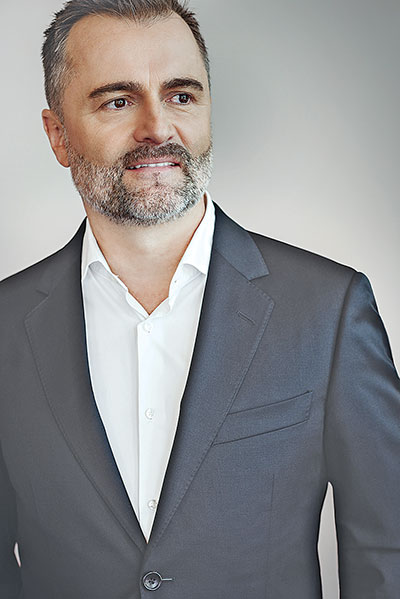There is still a lot of work ahead of us when it comes to Serbia’s long-term recovery. We must increase productivity and sustain investments that stimulate economic growth, but also realise that there can be no returning to the old ways of doing business. It’s about acceleration and prioritisation in the new reality.
We probably won’t be able to discard the term COVID-19 from our lexicon either this year or next, but that shouldn’t prevent us from accepting new ways of doing business and new technologies, considers Mike Michel, President of the Foreign Investors Council and CEO of Telenor Serbia. In the opinion of our interlocutor, the Government of Serbia should now focus on supporting these changes and motivating organisations and companies to turn to new technologies and innovations.
From the perspective of your members, how well has the Serbian Government responded to the challenges brought by the COVID-19 Pandemic?
I would say that the Government has done a solid job when it comes to what matters the most – making everyone safe. This has been the biggest challenge and priority in the past year and a half and, since January 2021, great work has been done with mass vaccination, although there’s still room for improvement, especially when it comes to young people. Providing easy access to vaccination is not enough to achieve a high uptake if people don’t agree to being vaccinated. In Serbia, we are around having 50% of people completely vaccinated, but this number needs to rise sharply, so that everyone is safe and won’t be surprised by something that will certainly come.
When it comes to the economy, Serbia is among the countries emerging in Europe that have been least affected by the pandemic. The Government has focused on helping those who’ve been hit the hardest: SMEs, entrepreneurs, tourism and transport, but has also offered support to medium-sized and large companies. A comprehensive package of emergency measures (monetary, fiscal and banking) is aimed at mitigating the negative economic impact of the crisis and this has brought results, as these measures are adequate and in line with the measures taken in most other countries. One example: the European Commission’s forecast for the unemployment rate was at 9.3% in 2020 and 9.6% in 2021. Just a few days ago, Serbia’s Parliamentary Committee on Finance gave the green light to a 200-million-euro loan from the European Investment Bank, which will be offered to SMEs who are facing the consequences of the COVID-19 crisis.
We cannot avoid COVID-19, but our focus should shift to activities that will accelerate further growth while taking steps to support the Government and citizens as they continue to embrace new ways of living and working
However, there is a lot of work ahead of us when it comes to Serbia’s long-term recovery. We must increase productivity and sustainable investments that stimulate economic growth, in order to overcome the significant rise in debt. And, on top of that, Serbia’s economy depends a great deal on the recovery of the EU, which is experiencing an economic crisis of historic proportions.
In which areas was the FIC’s contribution most relevant when it comes to safely navigating these difficult times?
I would say that our biggest contribution was drawing on the expertise and vast experience of our company members to help where it mattered most.
To clarify: we are the unified voice of more than 120 top companies in Serbia; our strength is that we can quickly, with flexibility and expertise, give recommendations on how to overcome any crisis, always having in mind the benefits for all sides.

And we mustn’t forget the great work that the FIC office has done, especially by establishing the practise of continuously collecting reports on day-to-day issues that hamper business operations and resolving them.
The FIC submitted proposals on the economic measures needed and input on how to implement them. Our flagship project, The White Book 2020, was successfully presented at an event that gathered key stakeholders, with about 400 people following it online. We have continued developing a dialogue with all relevant stakeholders, including the Government, the European Union, international financial organisations, the diplomatic corps and other similar associations. The FIC has been providing concrete proposals for regulatory improvements through its eight restructured working committees, while various working groups have been identifying issues that impede our business operations and initiating ways to resolve them. And, above all, we have worked hard to keep our employees safe, while at the same time managing to save jobs.
Although the pandemic is still with us, the world is increasingly preparing for new realities on the market. How well is the Serbian Government managing to address these changes through deeper reforms?
Even though the pandemic has become the new reality, it is still setting the course for 2021 and 2022. New virus mutations and the accumulating human toll raise concerns. Additionally, the outlook depends on how effectively economic policies deployed during times of high uncertainty can limit the damage from the crisis.
The government is the main body in charge of controlling epidemics and all aspects of them. The expectations and responsibility are huge, and not just in Serbia; this is something governments are facing all over the world. But it’s not about simply returning to the old ways of doing business. New ways of working, workplaces, innovations, customer habits and digitalisation have created both an imperative and an opportunity for organisations to embrace all the changes. The Government should focus on how to support those changes and motivate business in that direction. It’s more about accelerating and prioritising those elements than making drastic changes.
We are glad that the Serbian Government was receptive to the position of foreign investors when formulating its economic support measures and that we always have open and transparent communication
When it comes to the key areas that are in your focus, what are your main expectations of the Government in 2021?
Our expectations at the FIC remain the same as in previous years: further acceleration of reforms. In other words, continuing and accelerating accession negotiations with the EU, along with work on sustainable fiscal consolidation and an improvement to implementing laws. Anything that has been written in legislation must be applied, rapidly and with no exemptions.
There hasn’t been much space for dialogue between the Government and business during the pandemic. How has this impacted on the overall regulatory process? Which previous positive developments need to be reinvigorated?
At the FIC, we believe strongly in dialogue, and we had very intense conversations with the Government in 2020. Our flagship product, the White Book, is a great platform that’s based on the dialogue between investors and government aimed at driving change and working together to make Serbia a better place to invest. We are glad that the Serbian Government has been receptive to the position of foreign investors and that we always have open and transparent communication.

What should come next if we want to preserve the momentum and accelerate digital transformation processes?
In a word: digitalisation! More precisely: increased digitalisation, because the pandemic has made this more pressing. This was one of the priorities and main conclusions of the 2020 White Book and is definitely something we are still talking about in 2021. Artificial intelligence, autonomous systems, robotic process automation and smart city technology have largely beneficial results. The world needs to think more about how to help advanced technology achieve its full potential. It is fundamentally transforming the way we live and work, and making a deep impact on businesses in all sectors, through its effects on productivity, employment, skills and the environment. An EU regulation in this field is already in place, the Government is pushing its part of the job, and we have advanced the digital framework in the banking industry, so it’s now up to us, the private sector, to step up with innovative solutions.
The FIC has been providing concrete proposals for regulatory improvements through its eight restructured working committees, while various working groups have been identifying issues that impede our business operations and initiating ways to resolve them
The FIC White Book changed in 2020 to reflect the impact of COVID-19 on relevant regulatory areas. How will the 2021 edition look?
We cannot avoid the word COVID in 2021, that’s certain. The end of the pandemic may not be near, but this is no longer an unknown or scientifically dubious topic. The European Commission’s latest survey results suggest that activity in the EU economy has already shifted up a gear in recent months. So, no, we cannot avoid COVID, but our focus should shift to activities that will accelerate further growth while taking steps to support governments and citizens as they continue to embrace new ways of living and working. As always, we’ll provide a transparent presentation of the progress achieved during the year and address major areas for improvement.
What are your expectations when it comes to collaboration between the Government and the FIC via the White Book Task Force?
To continue being strong allies when it comes to making Serbia a great place to invest! The Government will always protect the economy by securing a stable and predictable business environment.
| PRIORITIES If we want to preserve the momentum and accelerate digital transformation processes, we must dedicate ourselves to even faster digitalisation, because the pandemic has made this more pressing. | COOPERATION We believe strongly in dialogue and want to continue being strong allies of the Government when it comes to making Serbia a great place to invest. | RESPONSIBILITY We have worked hard to keep our employees safe, while at the same time we’ve managed to save jobs. |
|---|